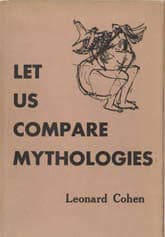Let Us Compare Mythologies
Critique • Quotes
 First edition
First editionFirst publication
1956
Literature form
Poems
Writing language
English
Author's country
Canada
Length
44 poems, 58 pages
Whispered midnight confessions
Some writers mythologize, raising everyday life to levels of cosmic significance, finding awful natural cycles in happenstance, wisdom in emotional upheaval.
Others de-mythologize, undercutting pretension, revealing the human and petty that underlie grand ideas, the mundane and the capricious in the seemingly awesome.
Leonard Cohen does both. His poetry, prose and song celebrate the play between the spiritual, profound and historical on one hand and the profane, petty and personal on the other—often within a single image. Christ pinned like a butterfly. A drunk in a midnight choir. A stuttering God.
Personally I prefer the secularizing Cohen. But, either way, he has certainly struck a chord with a lot of people. And many a phrase catches and intrigues me, despite my cynicism.
It all began with this book, Let Us Compare Mythologies. Mythologies, indeed. It is full of personal and public legends, but presented in simple, elegant language, in the rhythms of a person whispering confessions in your ear. Immediately accessible and mysterious at the same time.
Mixed images
Take the simple, complex act of love-making, for instance. In the poem "Letter", quoted elsewhere on this page, it is a relationship of both great significance and ultimate cynicism, a ceremony, a game of diplomacy, an alliance of enemies. But in "The Fly", he recounts finding an insect crawling up his sleeping lover's thigh:
And it ruined my day —
this fly which never planned
to charm her or to please
should walk boldly on that ground
I tried so hard
to lay my trembling knees
Other poems are shot through with Christian and Judaic religious imagery, as words like "consecrated", "prayers" and "saviours" occur in unexpected contexts alongside secular images. Sometimes they are brilliantly appropriate, as in the poem about Irving Layton, "To I.P.L.", in which his fellow Canadian poet and sometimes mentor is portrayed as a thundering rebel against angels (which was probably Layton's self-image too).
But in other cases the words appear to have been thrown in as an attempt to lend profound effect. Cohen seems content to use the surface trappings of religion without having any real interest in the substance of Christian or other creeds, at least in this early collection. (Not necessarily a bad thing.)
Experimentation of youth
In retrospect, now that the legend of the romantic young Bohemian has dissipated, the superficiality of some of the work can be seen more clearly perhaps. Several of the poems that seemed meaningful at the time now appear almost self-parody or obviously ironical in a Rod McKuenish way. To wit, the clever "Folk Song" in which the narrator has a bottle crafted to keep his lover's tears in but never uses it because "How could I know you could not cry?"
It is also apparent this is a young poet experimenting with styles, though more assuredly than most any other eighteen-to-twenty-two-year-old you might have read. Poems are mainly in free verse with a conversational or singing rhythm, but also include prose, rhymes, half-rhymes and other conventional techniques.
Overall though, it is a brilliantly accomplished, moving and intriguing collection of poems, whose mythological threads weave a sweetly melancholic atmosphere you can enter into from any point.
You may not be able to find this book easily these days as the last reprint in the twentieth century was, I believe, in 1966. The first edition of 1956 had a grand press run of only four hundred copies, which are said to be worth over a thousand dollars each now. A fiftieth anniversary edition was published in 2006. But, no matter, its best poems are included in Leonard Cohen selections and collections, which are widely available.
— Eric
Critique • Quotes

